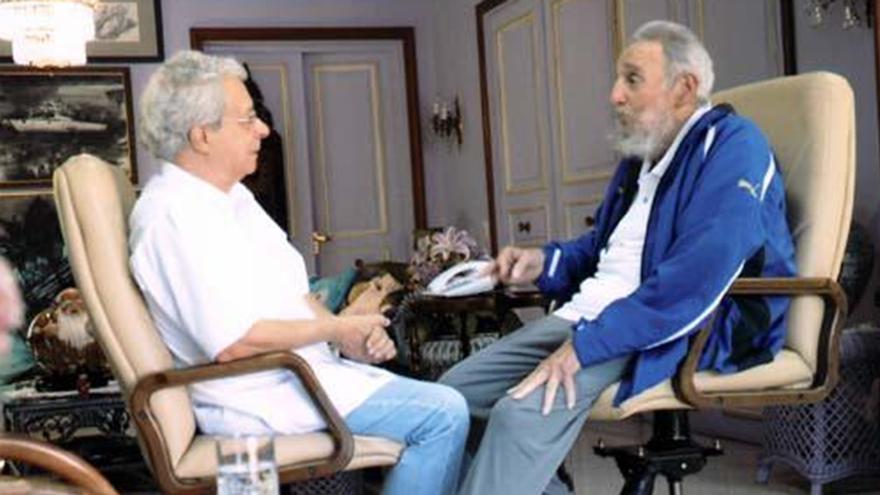
![]() 14ymedio, Havana, 26 December 2021 — “In Cuba there is no hunger. But the Cubans have a lot of appetite!” affirmed the Brazilian Frei Betto in a recent text published by the State newspaper Granma. In his writing, the theologian and sympathizer of the regime argues that the Government of the Island spends two billion dollars on imported food for the people each year, but ignores such everyday scenes as endless lines and shortages.
14ymedio, Havana, 26 December 2021 — “In Cuba there is no hunger. But the Cubans have a lot of appetite!” affirmed the Brazilian Frei Betto in a recent text published by the State newspaper Granma. In his writing, the theologian and sympathizer of the regime argues that the Government of the Island spends two billion dollars on imported food for the people each year, but ignores such everyday scenes as endless lines and shortages.
The theologian, very close to Fidel Castro, assures that on the island “there are no people living on the streets or beggars” when he asserts that the almost 12 million inhabitants in the country have “access to a basic monthly ’basket’ and to the systems of Health and Education for free.” However, even the official press itself has recognized the existence of homeless Cubans who ask for money to survive.
In his own words, in just two weeks he realized many things, including recognizing the Cuban economy is “fragile.” The letter published in the official media on December 24 and under the title Cuba and our daily bread, was the result of a visit as an advisor to the Government for the Food Sovereignty and Nutrition Education program (known as the SAN Plan).
Reactions have not been delayed. “What happened here? Frei Betto visits model farms and not popular stomachs?” asked Cuban opponent Manuel Cuesta Morúa after reading the Brazilian’s writing.
“Is it the new version of the geopolitics of hunger that blames the people, and not their governments? If it is true that we have a sweet tooth, then a regime incapable of satisfying us cannot govern us,” added the vice president of the Council for Democratic Transition in Cuba on his Twitter account as he shared screenshots of the theologian’s words.
In his writing, Betto outlined what would be the objectives of this program in Cuba, which coincide with some points that have marked the regime’s agenda for years and have not achieved concrete changes. Among them, he listed as the first “significantly reducing food imports,” a task in which the Government has been involved for decades without being able to raise its head.
Just to mention a recent example, in the last two decades, Cuba practically ceased to be a sugar-producing country, but it did not develop another industry of similar magnitude that would allow it to generate foreign exchange. That is why, for many experts, the current crisis on the island is related to structural problems: “The rigidity and distorted and inefficient character of the Cuban economy,” suggested economist Ernesto Hernández-Catá, a former professor at John Hopkins University (Baltimore).
Another objective that Betto listed for the SAN Plan and that is related to the first, is “to increase local food production, valuing family, urban and suburban agriculture,” another action addressed by the Government in its speeches without achieving transformations of any kind.
Among the latest policies, in April of this year 63 measures were approved that sought to increase agricultural production in the country, stimulate farmers and marketing. However, six months later, the livestock sector reported low milk production that was due to the failure of the government’s promises, including non-payment to producers.
Betto also indicated as goals “to carry out a broad nutrition education campaign” and “to carry out intensive communication on the SAN Plan.” All the objectives are expected to bear “fruit” in “the next four or five years,” he said, with the approval of Cuban president Miguel Díaz-Canel with whom he held several meetings and who considers the project “urgent and essential.”
On the other hand, he took time to criticize the eating habits of Cubans and advised that some “can be perfectly changed.” One example he gave was “the preference for wheat bread, an imported cereal,” he stressed.
As a substitute for wheat flour, Betto proposed making cassava, corn and “coconut flour” breads.
But it didn’t all did not stop there, he also had his proposal for meat, a product that not everyone will be able to buy this Christmas due to its high prices and the little that appears in the markets: “And meat can give a greater place to the consumption of beans, lentils , spinach, peanuts, soybeans and avocado, rich in protein,” he advised. “Although the island does not have many dairy cattle, the new generations are already getting used to soy milk and yogurt.”
The words of the Dominican have reminded many of the book Fidel and Religion, Conversations with Frei Betto, edited from a long interview conducted in 1985. In the volume, Castro explains his recipe for cooking lobsters and how to prepare coffee with milk to which he added a pinch of salt to give a special “touch.” At that time, shellfish was something unthinkable on the table of Cuban families and milk was rationed and supplied on to children under seven years of age.
____________
COLLABORATE WITH OUR WORK: The 14ymedio team is committed to practicing serious journalism that reflects Cuba’s reality in all its depth. Thank you for joining us on this long journey. We invite you to continue supporting us by becoming a member of 14ymedio now. Together we can continue transforming journalism in Cuba.
